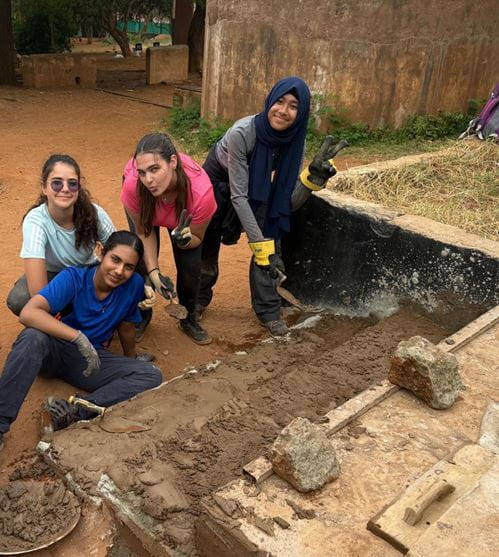We use cookies to improve your online experiences. To learn more and choose your cookies options, please refer to our cookie policy.


The goat was tangled around a tree.
We were in rural Kenya – sweat on our brows, goat deworming medicine in hand, and ferns around us. Using teamwork, adaptability, and strategy, we managed it. My partner gently freed the goat’s rope from the tree while I prepared the medication. She held him steady and I injected the medicine into his mouth. Once successfully dewormed, we released him back into his habitat.
As unlikely as it seemed, this moment captured the unexpected joys of service, teamwork, urgency, and leadership. Through trips like this, I came to understand UNICEF’s mission – one of compassion, leadership, and advocacy for children’s rights, health, and education - not just in words, but in practice.

The same week, I witnessed the stark contrast between the education system in Kenya and my own. Many of the everyday resources I use - smartboards, laptops - were absent from classrooms I visited. Teachers taught lessons on chalkboards. However, what stood out to me the most wasn’t the difference in resources, but the strength of their school community. Students took on leadership roles and showed a strong desire to learn and connect with new people. It was inspiring to see. I also met Mama Masi, a remarkable woman who dedicates her life to protecting children’s futures – protecting girls’ education, preventing early marriage, and spreading awareness about HIV and testing. Her persistance and impact showed me how powerful local change is and reminded me that advocacy often begins in our own community.

While working in a team to mix cement and plaster floors for school buildings, I often felt exhausted. But knowing it would lead to safer, more welcoming classrooms, all the effort was worth it. Whether helping a goat, teaching, introducing childhood games and connecting with local children in Swahili, every moment was meaningful and reminded me that small acts can create joy and belonging – key to children’s mental well-being and safety.
My medical observerships back in Qatar brought a different yet equally powerful kind of learning. Shadowing doctors, I witnessed how healthcare is deeply personal. Every patient carried their own story shaped by their culture, family, and social circumstances. I saw how much doctors do beyond diagnosis: they comfort, listen, problem-solve and adjust accordingly. Watching babies being cared for in neonatal units for instance, showed me how early intervention and increasing awareness of this care shape lifelong outcomes for children. From the food babies consume, to how parents play and interact with them, all affect the future of their development and health.

Outside the hospital, I joined the Doctors of the Future Conference and presented my school in the high school research competition. These opportunities inspired me to think about how I could contribute and make a difference in my community. Through projects like our Public Environmental Awareness Campaign (PEAC), research on carbon footprint and sustainable education, and diabetes awareness slides, we advocated for health and sustainable habits – from carpooling, and reducing electricity to balanced diets and journaling. I saw how simple changes, when communicated well, can spread real conversations and positive actions in students.
At The Hague International Model United Nations Qatar (THIMUN Qatar), I took on the role of Head of Layout in charge of the overall look of the the conference newsletter and communicating with the newsletters and photography teams. In just five days, we produced 4 newsletters covering global issues and highlighting Sustainable Development Goals 11 and 12. It was fast-paced and stressful at times, but it taught me the value of communication and teamwork in supporting activism and important causes. It was even more fulfilling to hear of the high demand of the issues from international delegates and organisers.
Lastly, my Duke of Edinburgh Gold hiking practice tested my resilience in physical and mental ways as well. Through longer-than-usual hikes, the Qatari heat, and blisters, it challenged me to stay calm under pressure and look out for others in the team experiencing the same. The journey taught me endurance and the importance of morale - a crucial skill in community service and persistence.
Each experience reminded me that inequality and global issues – whether in healthcare, opportunity, or education – isn’t just something to study for in school. It’s real, but so is the chance to help. By learning, organising, and sharing, these trips not only helped me connect with UNICEF’s mission, but live through it through meaningful actions.
Fladina G.
IB student